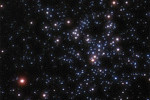Home > Industry/Domain > Astronomy
Astronomy
The scientific study of planets, stars, black holes, comets and other celestial bodies that make up outer space.
13Categories 47688Terms
Add a new termContributors in Astronomy
Astronomy > Astrometry 
gyroscope
Astronomy; Astrometry
An instrument that is made of a disk or wheel that spins about an axis like a top. Gyroscopes are used to keep spacecraft in the right position.
parsec
Astronomy; Astrometry
A unit of length equal to 3.26 light -years. Scientists use parsecs to measure the distance between objects in outer space.

stars
Astronomy; Astrometry
Stars are a luminous conjunction of plasma held together by gravity. The light that comes from the stars is produced by thermonuclear fusions of hydrogen in its core. During the ...
Absolute Zero
Astronomy; Astrometry
The temperature at which the motion of all atoms and molecules stops and no heat is given off. Absolute zero is reached at 0 degrees Kelvin or -273.16 degrees Celsius.
Atmosphere
Astronomy; Astrometry
A layer of gases surrounding a planet, moon, or star. The Earth's atmosphere is 120 miles thick and is composed mainly of nitrogen, oxygen, carbon dioxide, and a few other trace ...
aurora
Astronomy; Astrometry
A glow in a planet's ionosphere caused by the interaction between the planet's magnetic field and charged particles from the Sun. This phenomenon is known as the Aurora Borealis ...
Black Hole
Astronomy; Astrometry
The collapsed core of a massive star. Stars that are very massive will collapse under their own gravity when their fuel is exhausted. The collapse continues until all matter is ...
Sub-categories

- Astrometry (117)
- Astronaut (14221)
- Comets (3684)
- Cosmology (251)
- Galaxy (567)
- General astronomy (16061)
- Mars (1797)
- Mathematical astronomy (130)
- Moon (1858)
- Planetary science (7689)
- Planetology (678)
- Radio astronomy (37)
- Solar system (663)
